 |
| Ann Carson |
The 10 Best
Poetry Collections
of the Decade
Emily Temple
October 15, 2019
Friends, it’s true: the end of the decade approaches. It’s been a difficult, anxiety-provoking, morally compromised decade, but at least it’s been populated by some damn fine literature. We’ll take our silver linings where we can.
So, as is our hallowed duty as a literary and culture website—though with full awareness of the potentially fruitless and endlessly contestable nature of the task—in the coming weeks, we’ll be taking a look at the best and most important (these being not always the same) books of the decade that was. We will do this, of course, by means of a variety of lists. We began with the best debut novels of the decade and the best short story collections of the decade, and we have now reached the third list in our series: the best poetry collections published in English between 2010 and 2019.
The following books were chosen after much debate (and several rounds of voting) by the Literary Hub staff. Tears were spilled, feelings were hurt, books were re-read. And as you’ll shortly see, we had a hard time choosing just ten—so we’ve also included a list of dissenting opinions, and an even longer list of also-rans.
I will say that this list was the hardest we’ve done so far—poetry is extremely subjective, and true consensus was rare (except for Claudia Rankine, for whom almost everyone in the office voted). And NB that for this one, we excluded huge “collected poems” for range. So please feel extra free to add any of your own favorites that we’ve missed in the comments below.
***
The Top Ten
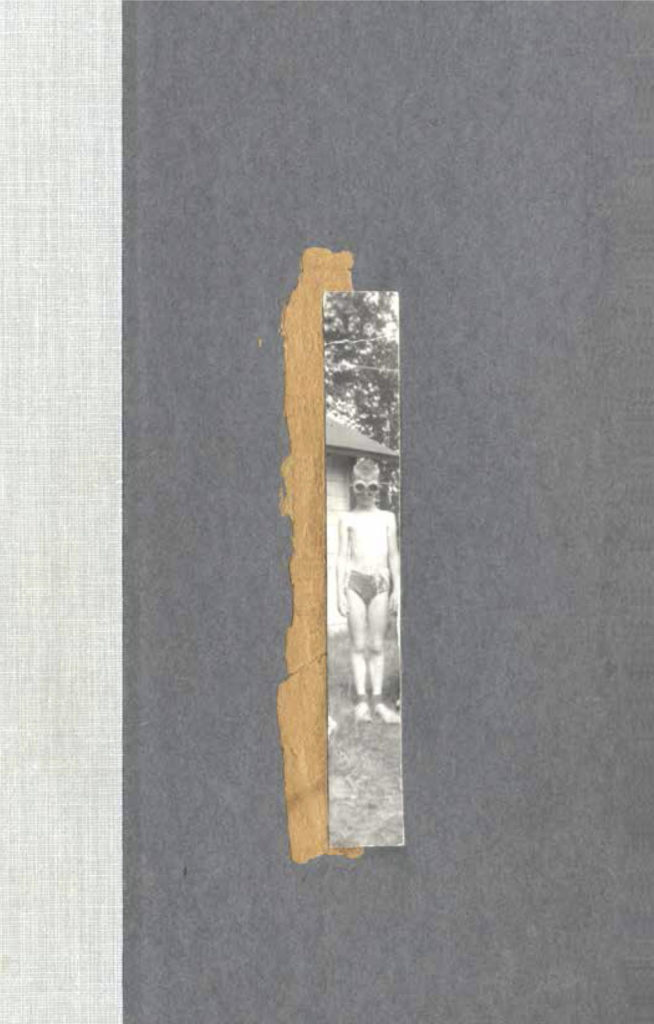 ANNE CARSON, NOX
ANNE CARSON, NOX
(2010)
Was there ever a book quite like Nox? I mean, there’s an argument it isn’t even a book, but a box. Inside is a folded, accordion-like object, which, as it turns out, is a full-color copy of one of Carson’s own notebooks. It is the notebook—including its stains, its mistakes, the ink that shows through the other sides of pages—in which Carson grappled with the 2000 death of her older brother Michael.
This being Anne Carson, said grappling comes at least partially through translation: she starts with a poem by Catullus, in Latin, an elegy written after the death of his own brother. Carson begins to translate the poem, keeping this scholarly work on the left hand side—dictionary entries for each word in the poem, Latin to English. This lexicography balances out her sparse narration, which appears on the right, a few poems and musings, along with a number of photographs, letters, things stuck in. But soon, Nabokov-like, the lexicography becomes a narration of its own, and the double strands begin to twist into a profound expression of grief as well as an interrogation thereof.
It’s highly original, and, if I’m being fair, only halfway poetry. But there’s simply no other category for a book that’s as much art object as work of literature, or the enormous emotional weight shifted by just a few scattered words. It’s one of the best books of any kind I’ve read in the last decade (and definitely the best box), so I have no doubt that it belongs here. –Emily Temple, Senior Editor
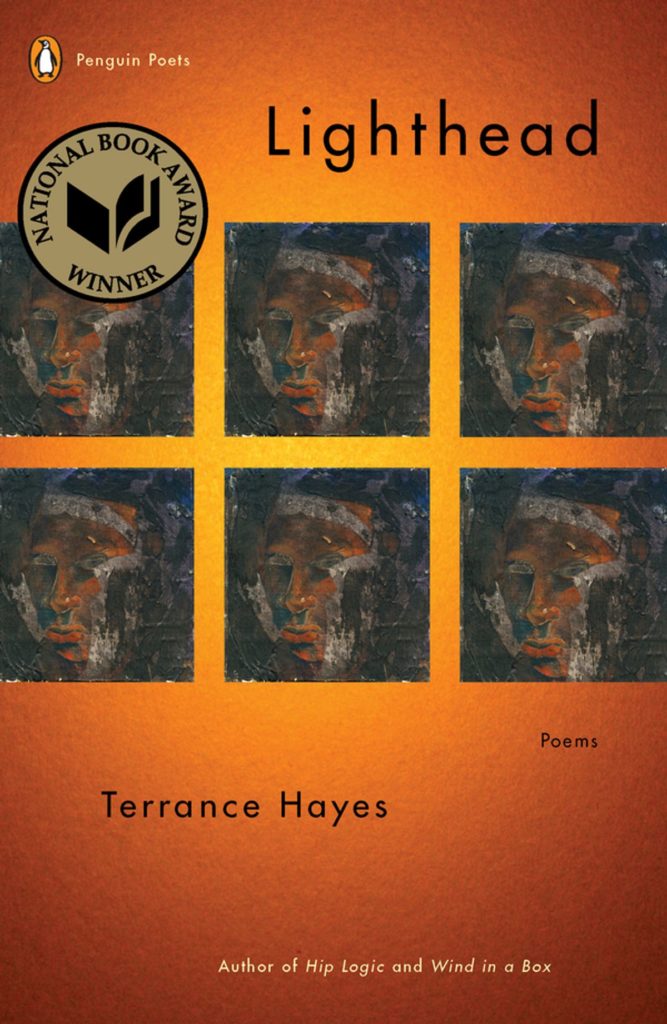 TERRANCE HAYES, LIGHTHEAD
TERRANCE HAYES, LIGHTHEAD
(2010)
In 2015, Terrance Hayes visited a class of teenagers in Pittsburgh. Stephanie Burt of The New York Times described how their attention shifted, becoming sharper, as Hayes brought up film, hip-hop, their hometown, and, eventually, poetry. “A poem is never about one thing,” Hayes said. “You want it to be as complicated as your feelings.”
Hayes’ poems are complicated. His writing moves quickly, with a constantly changing rhythm and a center in motion, and the resulting poems are buoyant, often playful, as they cover ground from desire to race and violence. His prodigious ability to experiment with form and syntax are on full display in Lighthead, his fourth collection and the winner of the 2010 National Book Award for Poetry. “Lighthead’s Guide to the Galaxy” points to this ability in a larger statement on what constitutes poetry in general: “Not what you see, but what you perceive: / That’s poetry. Not the noise, but its rhythm; an arrangement / of derangements; I’ll eat you to live: that’s poetry.”
Burt noted in her report that at a certain point, Hayes the person came as much, or more, a subject of public fascination as his writing, and that many people approach him by asking the excruciating question of “what it means to be a spokesman for poetry.” Hayes and his poems both push back on this kind of proclamation as well as any one particular form or identity; removing himself from the equation entirely, Hayes writes in Lighthead, “I know all words come from preexisting words / and divide until our pronouncements develop selves.” Lighthead is an incredible collection of these pronouncements, and together they form a remarkable achievement. –Corinne Segal, Senior Editor
 TRACY K. SMITH, LIFE ON MARS
TRACY K. SMITH, LIFE ON MARS
(2011)
Last year, in an interview with Krista Tippett of On Being, Tracy K. Smith described the act of writing poetry as perpetually, and necessarily, expansive:
“Language urges you to push against what you might think you know, what you might initially be inclined to draw from what you’ve observed and even what you believe. That’s exciting because you’re wandering away from the things that you feel confident of, and you’re wandering into a place where—oh, maybe you’re not so right. Maybe you’re vulnerable in ways that you hadn’t anticipated, and maybe the vulnerability that you’re willing to claim isn’t the whole story.”
In Life On Mars, which won the Pulitzer Prize for Poetry in 2012, Smith wanders past earthly boundaries and looks upward, weaving the history and popular conception of human exploration in space with the story of her father, who worked on the Hubble Space Telescope and whose death is the collection’s center of gravity. Moving between singular moments of personal grief and pop-culture narratives of the space race, from science fiction to David Bowie, Smith’s poems address the far reaches of human understanding. Beholding the Hubble’s first images, she writes, “We saw to the edge of all there is— / So brutal and alive it seemed to comprehend us back.”
But she does not stay permanently in the realm of the abstract—much of the collection lingers on the relationships that make up our lives on Earth, the expansiveness of grief, and its existence on a scale both personal and planetary. Smith’s poems address environmental disaster, hate crimes, and political controversies, all embedded in the larger story that America tells itself about its role in the universe. Librarian of Congress Carla Hayden, in announcing Smith’s appointment as U.S. Poet Laureate in 2017, called her “a poet of searching”; her reaching for connection and understanding, of all this and more, is at its best here. –Corinne Segal, Senior Editor
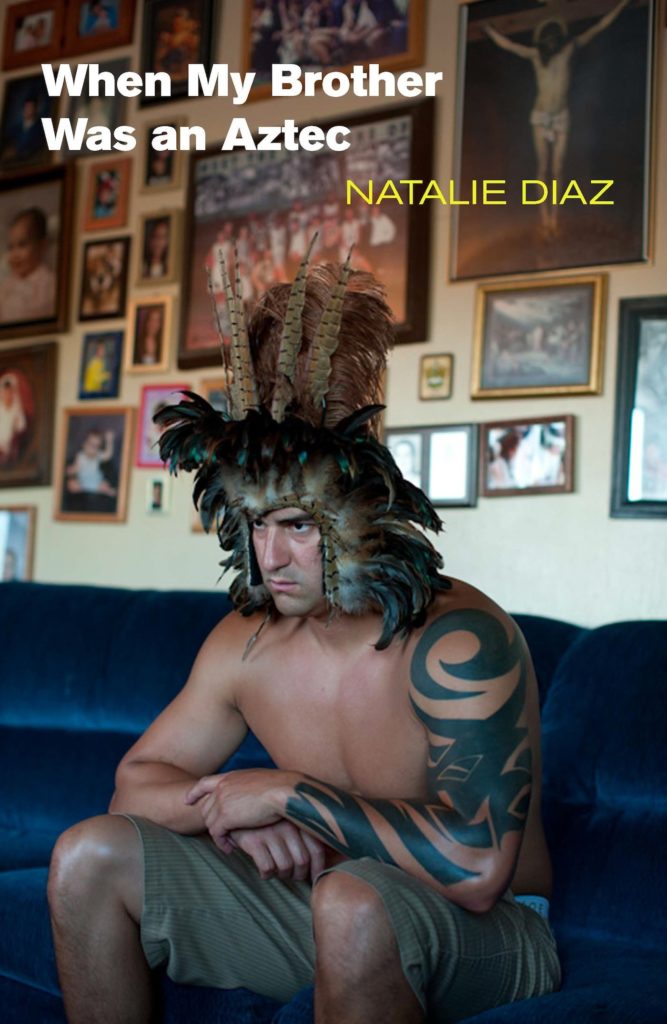 NATALIE DIAZ, WHEN MY BROTHER WAS AN AZTEC
NATALIE DIAZ, WHEN MY BROTHER WAS AN AZTEC
(2012)
Mojave American poet and language activist Natalie Diaz (a 2018 MacArthur Genius Grant recipient) is one of those rare and exceptional writers who can seamlessly blend the personal, the political, and the mythic to create shimmering gems that are both joyous and horrifying, tender and brutal, intimate and sweeping. In her debut collection, Diaz, who is an enrolled member of the Gila Indian Tribe, reflects with visceral imagery and sensuous language on her brother’s methadone addiction, her childhood experiences of reservation life, the continued oppression and fetishization of Native Americans in contemporary US society, and the nature of romantic, erotic, and familial love within indigenous communities. In the title poem, Diaz draws from Christian, Mojave and ancient Greek mythic traditions conjure a version of her brother both awesome and terrifying, a godlike figure who destroys and remakes both himself and his family as his addictions overwhelm him (“My parents gathered what was left of their bodies, trying to stand without legs, / trying to defend his blows with missing arms, searching for their fingers / to pray, to climb out of whatever dark belly my brother, the Aztec, / their son, had fed them to). In “Hand-Me-Down Halloween,” the girl child speaker, already worn down by neighborhood prejudice and the sneers of her mother’s boyfriend, explodes with rage at a white boy who taunts her for wearing his cast-off costume (“He was / the skeleton walking past my house / a glowing skull and ribs / I ran & tackled his / white / bones / in the street / His candy spilled out / like a million pinto beans”). Truly the most brilliant and affecting poetry collection I’ve read in an age. –Dan Sheehan, Book Marks Editor
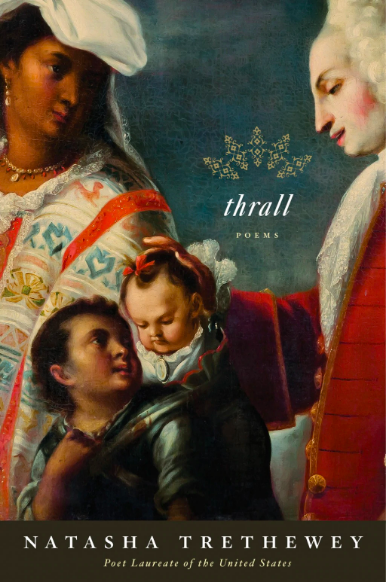 NATASHA TRETHEWEY, THRALL
NATASHA TRETHEWEY, THRALL
(2012)
If we can’t fully discern the motivations of the people in our immediate circles, the people in our own homes, can we expect to understand the nature of a “race” of people or the various circles that contain them—the family, the nation? This question guides the poems in Natasha Trethewey’s Thrall, a collection about various kinds of bonds: between Trethewey, a mixed-race woman, and her white father; between Enlightenment-era arbiters of knowledge—scientists, philosophers, artists—and their non-white (and often female) subjects; between the mixed-race subjects of 17th and 18th-century paintings and Trethewey herself. “Call it the catalog / of mixed bloods, or / the book of naught” Trethewey writes, referring to the Book of Castas, which categorized children born of colonial Mexico’s mixed unions, “not Spaniard, not white, but / mulatto-returning-backwards (or / hold-yourself-in-midair) and / the morisca, the lobo, the chino, / sambo, albino, and / the no-te-entiendo—the / I don’t understand you . . . it is the typology of taint, / of stain.” Trethewey covers the blurry history of conquest both physical and mental most movingly in the titular poem, in which the Spanish painter and ex-slave Juan de Pareja speaks of his former owner, one of the most famous artists of the Spanish Golden Age, Diego Velázquez: “How intently at times / could he fix his keen eye / upon me / though only once /did he fix me in paint / my color a study.” Trethewey compels us to read many of her ekphrastic poems through the lens of her complicated—loving, melancholic and at times blatantly troubling—relationship with her late father, a man who the author-narrator often supported during his struggles with alcoholism, who took her fishing and gingerly touched her neck, and who could also be an apologist for Thomas Jefferson’s slave-holding practices. With Thrall, Trethewey questioned the evolving logic of white paternalism as one who literally embodies its vague promises. In addition to being one of the decade’s most technically and emotionally complex criticisms of the “black/white” racial binary, it was also an invigorating addition to the field of art criticism. –Aaron Robertston, Assistant Editor
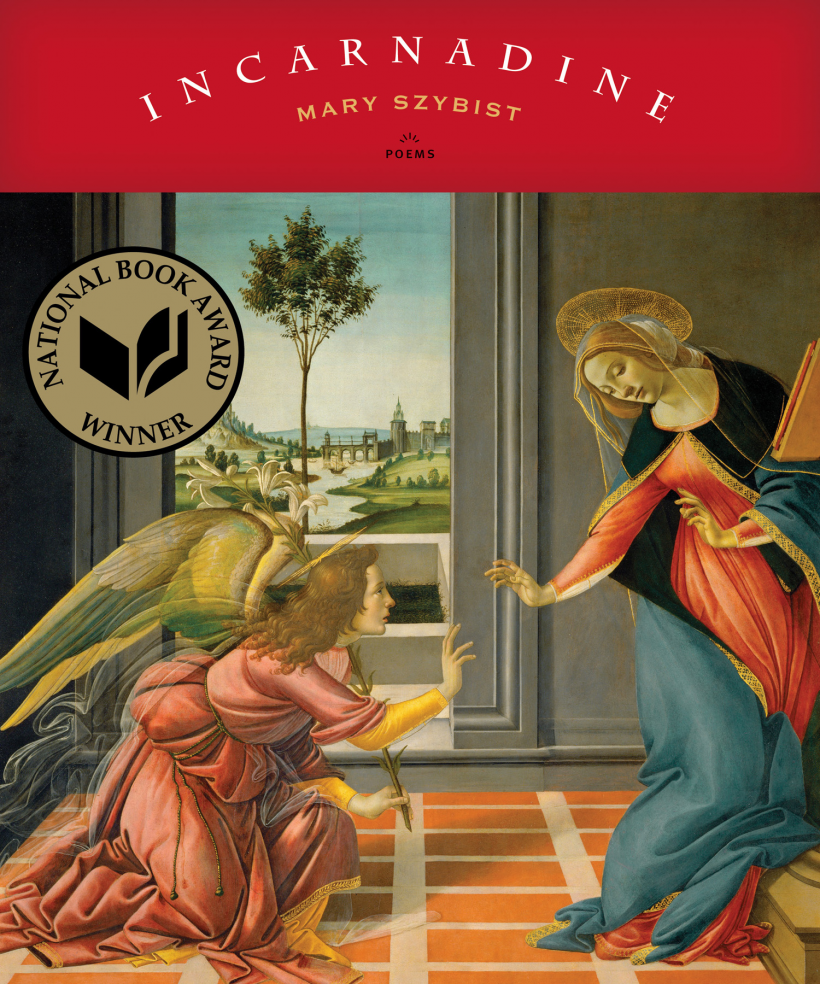 MARY SZYBIST, INCARNADINE
MARY SZYBIST, INCARNADINE
(2013)
This is a God-soaked book, a book whose core is the Annunciation, or rather a series of annunciations, that recur in Kenneth Starr and Lolita and butterflies (“What slouches // toward us?” she asks. “I think I see annunciations everywhere: blackbirds fall out of the sky, trees lift their feathery branches, a girl in an out-sized yellow halo speeds toward—”); I am a committed atheist and arch skeptic who knows no Bible stories, by stubborn design. And yet, I love it, almost on language alone: these 42 poems are incantatory and innovative—one is an abecedarian, one is in the shape of the sun, one is a diagrammed sentence, one is a collage—and overwhelmingly about longing, especially longing for and fearing the unknowable, which you don’t have to have any particular spirituality or religious upbringing to recognize.
When it won the 2013 National Book Award for Poetry, the judges wrote:
In her gorgeous second collection, Mary Szybist blends traditional and experimental aesthetics to recast the myth of the Biblical Mary for this era. In vulnerable lyrics, surprising concrete poems, and other forms, and with extraordinary sympathy and a light touch of humor, Szybist probes the nuances of love, loss, and the struggle for religious faith in a world that seems to argue against it. This is a religious book for nonbelievers, or a book of necessary doubts for the faithful.
I couldn’t agree more. –Emily Temple, Senior Editor
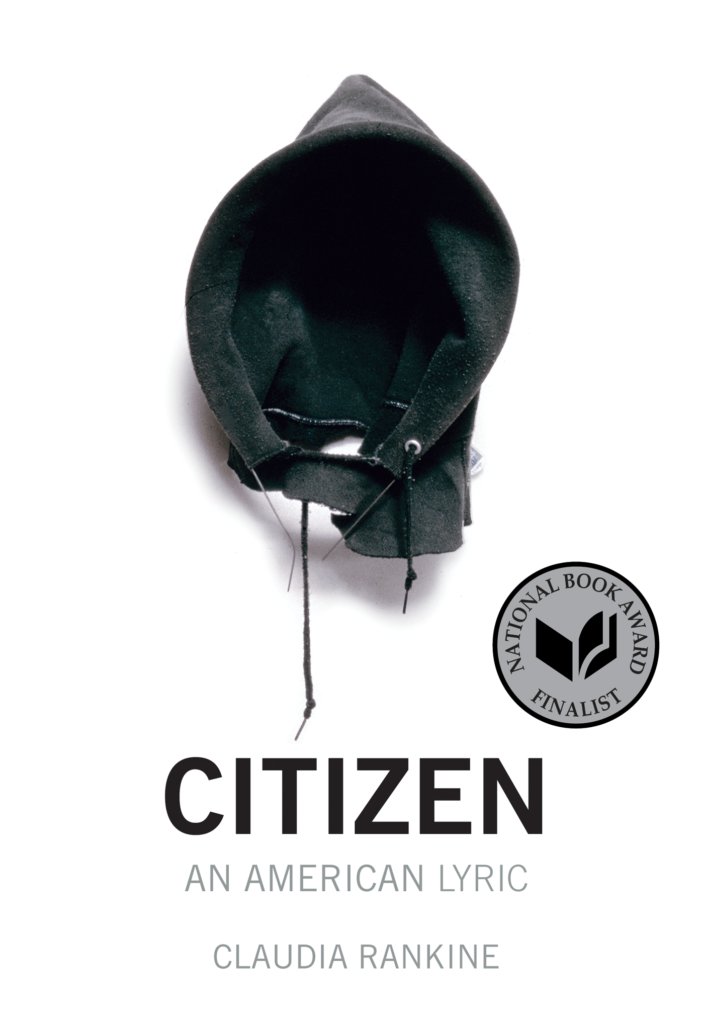 CLAUDIA RANKINE, CITIZEN: AN AMERICAN LYRIC
CLAUDIA RANKINE, CITIZEN: AN AMERICAN LYRIC
(2014)
You may recognize Claudia Rankine’s Citizen as the book—not just book of poetry, but book, full stop—that the Literary Hub staff voted most likely to endure in the literary canon of a decade from now. It is a special hybrid of a book, part poetry, part critical essay—the book won the 2014 National Book Critics Circle Award in Poetry, and was a finalist for the same award in Criticism—making use of screenplay form, screengrabs, art, and iconic pop culture images. It is a complex assessment of racism in contemporary America, on both a micro and macro scale, addressing Rankine’s own experiences, as well as stories of Serena Williams, Zinedine Zidane, stop-and-frisk, President Obama, Hurricane Katrina, police violence—the whole heartbreaking, embarrassing litany of examples of American prejudice, or at least as close as we’ve gotten in recent memory. Rankine won a MacArthur in 2016, but most of us have been calling her a genius for years.
The book is also artful, beautiful, sometimes funny, subtle when subtlety is required, razor sharp when that better suits her needs. It investigates memory and identity and the nature of narrative and self-doubt and self-expression. I don’t know anyone who has read it who was not profoundly moved by it. As Dan Chiasson put it in The New Yorker, “The realization at the end of this book sits heavily upon the heart: ‘This is how you are a citizen,’ Rankine writes. ‘Come on. Let it go. Move on.’ As Rankine’s brilliant, disabusing work, always aware of its ironies, reminds us, ‘moving on’ is not synonymous with ‘leaving behind.’” –Emily Temple, Senior Editor
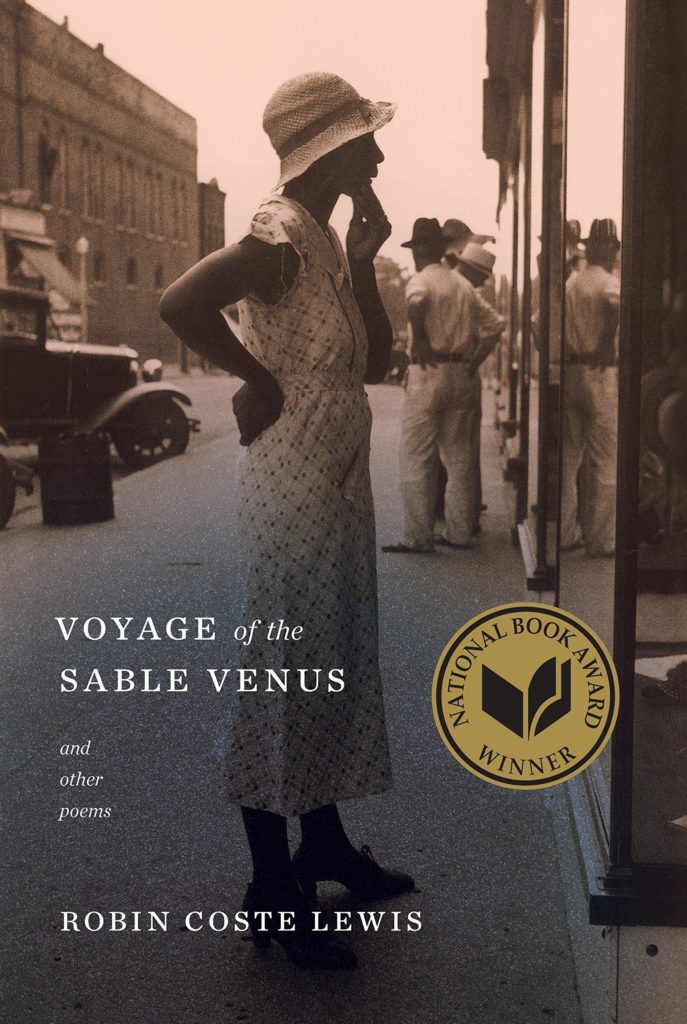 ROBIN COSTE LEWIS, VOYAGE OF THE SABLE VENUS
ROBIN COSTE LEWIS, VOYAGE OF THE SABLE VENUS
(2015)
It is easy enough to think of history as more-or-less the diligent assemblage of fact, a collective project aiming at the one true chronology of who we are and where we come from; this, of course, is a lie told by the victors, the reigning “WE” of so many middle-school text books who’ve always known that myth maps over power, and that the dominant story yields the dominant people. Robin Coste Lewis sees this lie and seeks to dismantle it with Voyage of the Sable Venus, her astonishing 2015 debut collection, the (perhaps) unlikely and (definitely) deserving winner of the National Book Award for Poetry.
The ambition of Coste Lewis’s project is revealed in the precision of its limitations, as described in the first sentence of the prologue:
[Voyage of the Sable Venus] is a narrative poem comprised solely and entirely of the titles, catalogue entries, or exhibit descriptions of Western art objects in which a black female figure is present, dating from 38,000 BCE to the present.
What follows is a poetic document of such revelatory force that it quickly leaves its conceit behind, uncovering fragment by disinterred fragment a lyric archive of Black bodies—their pain, their beauty—etched in relief across centuries of someone else’s history. But this is no mere catalogue of suffering: it is at once lament, testimony, and celebration; somehow, Coste Lewis alchemizes intimacy from the descriptions of the powerless by the powerful, and in subverting that reduction into poetic expansion, has rewritten us a new and limitless history. –
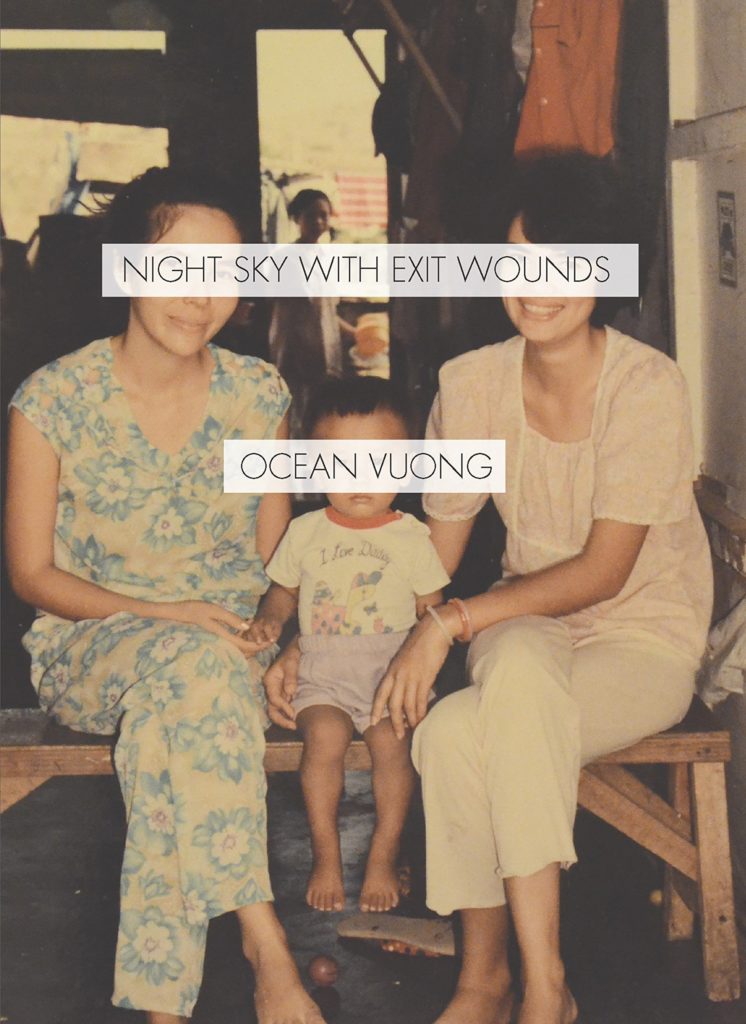 OCEAN VUONG, NIGHT SKY WITH EXIT WOUNDS
OCEAN VUONG, NIGHT SKY WITH EXIT WOUNDS
(2016)
The Vietnamese-American poet and novelist Ocean Vuong is a master of subtle, yet sudden metamorphoses, his language as dense with beauty as it is with violence and horror. Somehow, he blends the two. In “Trojan,” an early poem in his collection Night Sky with Exit Wounds, Vuong describes a man who “steps into a red dress. A flame / caught / in a mirror the width of a coffin. Steel / glinting / in the back of his throat.” Later, we see the “dress / petaling off him like the / skin / of an apple. As if their swords / aren’t sharpening / inside him.” In the end, Vuong reflects that people will see this boy in a dress “clearest / when the city burns.” It’s quietly stunning, really, the way Vuong transforms images of sheer terror and bloodshed into an almost fey splendor—and often a queer splendor, at that. Night Sky with Exit Wounds even manages to transform the fall of Saigon into a world of imagery as sharp, bloody, and brutal as it is, disquietingly, beautiful in its diction. Yet beneath his bewitching language is pain: the mangled limbs of a dog, a facedown corpse, a city on fire juxtaposed, incredibly, to the lyrics of Irving Berlin’s “White Christmas”—which Vuong notes was actually an American military “code to begin Operation Frequent Wind, the ultimate evacuation of American civilians and Vietnamese refugees by helicopter during the fall of Saigon.” The poem, “Aubade with Burning City,” is chilling, haunting, its quick evocations of imagery set against music the kind of thing that sticks with you, holds you, scares you in a way it is easy for people who rarely read poetry to remember that a poem indeed can. Vuong stuns me over and over, and it all seems so effortless. This is a book that, even just from its title, I know I won’t soon forget, a book that, in the best and most unsettling of ways, will haunt me. –Gabrielle Bellot, Staff Writer
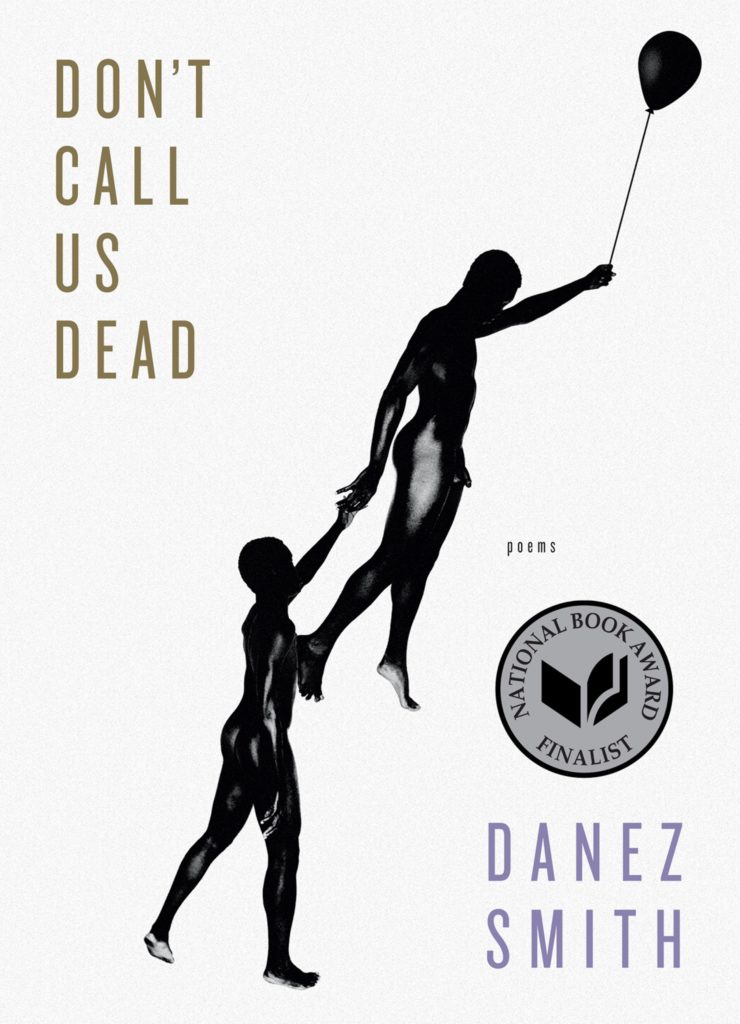 DANEZ SMITH, DON’T CALL US DEAD
DANEZ SMITH, DON’T CALL US DEAD
(2017)
Danez Smith’s second collection is one of those rare poetry books that is near-universally praised by poets, but which also captures the attention of even fair-weather friends of poetry. The collection crackles with joy, humor, violence—all expressed with great beauty and great urgency. “Urgent,” I realize, is a somewhat overused word, particularly when it come to poetry, but in this case I must insist, not only because of the content of the work but also because of its rhythmic insistence. Smith has a background as a slam poet, and the poems in Don’t Call Us Dead feel propulsive in the way of spoken word while also exulting on the power of the page. Smith draws from disparate poetic traditions in order to create something entirely new.
These poems are about bodies—the bodies of young black boys killed by police, Smith’s own body in the wake of their H.I.V. diagnosis, queers bodies in lust (“cum wonder & blood hallelujah”). In her review of the book for The Washington Post, Elizabeth Lund writes that Smith’s poems “demand that people understand why the speaker wants to leave Earth ‘to find a land where my kin can be safe.'”
Don’t Call Us Dead is a collection both universal and highly personal, as, I think, all the best poetry is. But it also feels both of our present time and timeless, both defined by and defining. –Jessie Gaynor, Social Media Editor
***
Dissenting Opinions
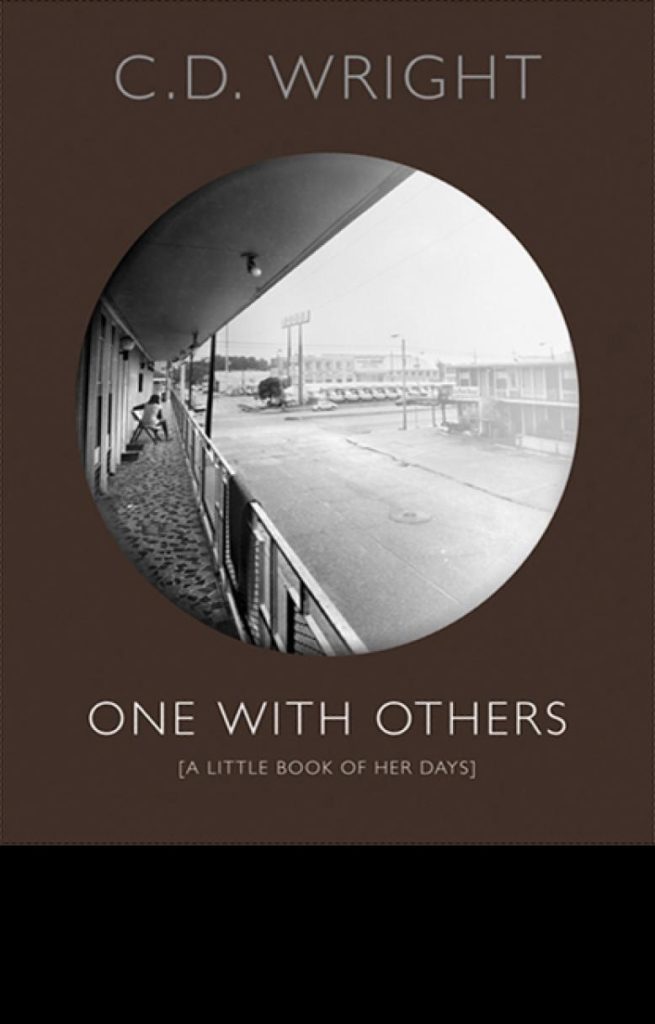 C.D WRIGHT, ONE WITH OTHERS
C.D WRIGHT, ONE WITH OTHERS
(2010)
CD Wright could be on this list for any number of books she wrote in the last decade—which is saying a lot, considering she died far too early, in 2016. Even her posthumous meditation on the beech tree, Casting Deep Shade, could probably survive aggressive cross-genre shoehorning from lyric nonfiction to poetry.* So with that sort of inter-disciplinary invention in mind, I offer you Wright’s 2011 National Book Award finalist, One With Others, a book-length poem that could also be described as… lyric documentary?
On its surface, poetry seems the least ready form for rendering things as they happened, as far from the dispassionate camera—its guileless capture of this moment or that—as one might imagine. But in One With Others, based around Margaret Kaelin McHugh, a small-town Arkansas woman (and mentor to the poet), Wright undertakes a kind of journalism of poetics, conveying the full breadth of a historical moment during the tail-end of the Civil Rights era with all the fragmentary detail of an inexhaustible documentarian. Transcribed speech, catalogues of objects, idiosyncratic lists, all of it refracted through the life of a white woman who decided to join a Black march and was ostracized for it. In retrospect, it is easy to question the project of a white poet using a white character to capture a significant moment in Black history, but with that same ease we can say that Wright pulled it off, and for that reason—among countless others—we are forever lucky to have had her as poet and witness both. –Jonny Diamond, Editor in Chief
*Probably not.
 MARK LEIDNER, BEAUTY WAS THE CASE THEY GAVE ME
MARK LEIDNER, BEAUTY WAS THE CASE THEY GAVE ME
(2011)
I first read Mark Leidner’s debut collection when I was a very lonely first year MFA student feeling incredibly alienated from poetry—the very thing to which I was meant to be devoting all my time. A professor had recently called my work “funny” in a voice so dripping with disdain that everyone in the workshop avoided eye contact with me for the next hour, either out of kindness or fear of contagion. Into this period of despair came Beauty Was the Case They Gave Me, which proved to be the exact right collection for a person who feared that her propensity to be “funny” was mutually exclusive with any desire to create Real Poetry. This collection is funny, no disdain, no scare quotes, no “for a book of poems” caveat. It’s the book I recommend to anyone who asks me what they can read to “get into” poetry (even when I’m pretty sure they’re only asking to be polite), and the book I used to teach my intro to creative writing students to prove how cool I was (it didn’t work, but I don’t blame Leidner for that).
Let me tell you about “Romantic Comedies,” perhaps my all-time favorite contemporary poem, which consists of premises for romantic comedies: “She likes things one way and he likes them the other” and “She’s a pale-skinned aesthete who edits a webzine, and he’s a suntanned meathead completely perplexed by the masthead” and “He calls Nashville, laughingly, Nashvegas, but she calls Nashville, icily, Nashville.” Besides being funny, this collection also believes deeply in connection, in—yes—love. Besides being funny, this collection also believes deeply in connection, in—yes—love. “I still love the river, I told her,” Leidner writes in “The River.” “But I do not love it because it is deep, and fast, and drowns many people. I love it because it runs behind my house, and I have lived above it forever.” –Jessie Gaynor, Social Media Editor
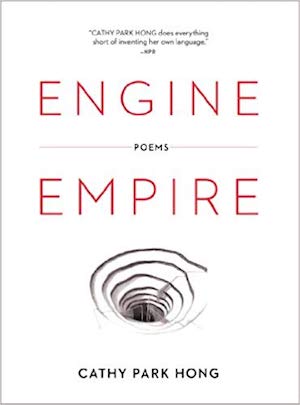 CATHY PARK HONG, ENGINE EMPIRE
CATHY PARK HONG, ENGINE EMPIRE
(2012)
It’s a tricky thing to write a timeless book about the future. Though Engine Empire, Cathy Park Hong’s 2011 collection, is not about the future, strictly speaking—it is a triptych, one section occurring in the American west, mid-civil war; one in contemporary urban China, and one in near-future California—it is one of the most eloquent renderings of (at least my own) future-anxiety that I’ve ever read.
Each section of the book takes place on a different frontier. In an interview with The Paris Review about the collection, Hong said, “To dream of the frontier is also to desire immortality. But there is no such thing as new territory. There are always previous civilizations, societies, families, and cultures. So when we build new worlds, there will be violence.” At a time when a new frontier feels like just another place for a billionaire to ruin, there’s something especially comforting in Hong’s naming this ruination.
Engine Empire deals with detachment and the violence of “progress” across three landscapes, which is much less dour than perhaps it sounds. Hong plays with vernacular, genre, and form to create new myth even as it questions the very idea of myth-making. She writes in ballads, half-sonnets, creating her own rules and games as she goes. Though I find that relentless formal experimentation within a collection can often drown out meaning, here it works in service to the collections cinematic feel. To quote David Mitchell, who blurbed the collection, “Cathy Park Hong is a seer of visions.” –Jessie Gaynor, Social Media Editor
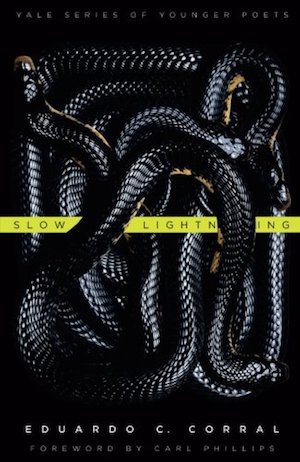 EDUARDO C. CORRAL, SLOW LIGHTNING
EDUARDO C. CORRAL, SLOW LIGHTNING
(2012)
I read Eduardo C. Corral’s Slow Lightning in 2013, and I have thought about it maybe once a week ever since. Writing in both English and Spanish, Corral considers the fluctuations of his own identity along many lines. Focusing mostly on his experiences as a Chicano and gay man, and setting many of his poems in disparate moments in the same landscape (the American west), he stresses how things can be both the same and different—how labels and categories interact with an unfixed, changing self. “. . . part of Corral’s point is that language, like sex, is fluid and dangerous and thrilling, now a cage, now a window out,” writes Carl Phillips, in the foreword. Corral conjures cowboys, caballeros, and border patrol police officers—as well as confronts the name “AIDS” and being called “illegal” in America. He acknowledges the code-switching that gets done in practical life, but dwells more on what it simply means to be exist, and not exist, in so many ways. Corral’s narrators are haunted—not only by notions of their own simultaneous desirability and undesirability (and the differing criteria by which these factors are judged) but also by their heroes, including Frida Kahlo and Langston Hughes, and their relationships, particularly with fathers, partners, and God. In fact, many of Corral’s poems are responses to, and direct evocations of, poems by Robert Hayden. But he also imagines the stories of others with shared experiences, people who aren’t given names—in “Border Triptych,” which is written from the perspective of a young woman, he tells of anxious women crossing the national border who expect to encounter opportunistic and cruel ICE agents and therefore go to great lengths to fake menstruation in the hopes of deterring rape attempts. This poem haunts me, and it always will. –Olivia Rutigliano, CrimeReads Editorial Fellow
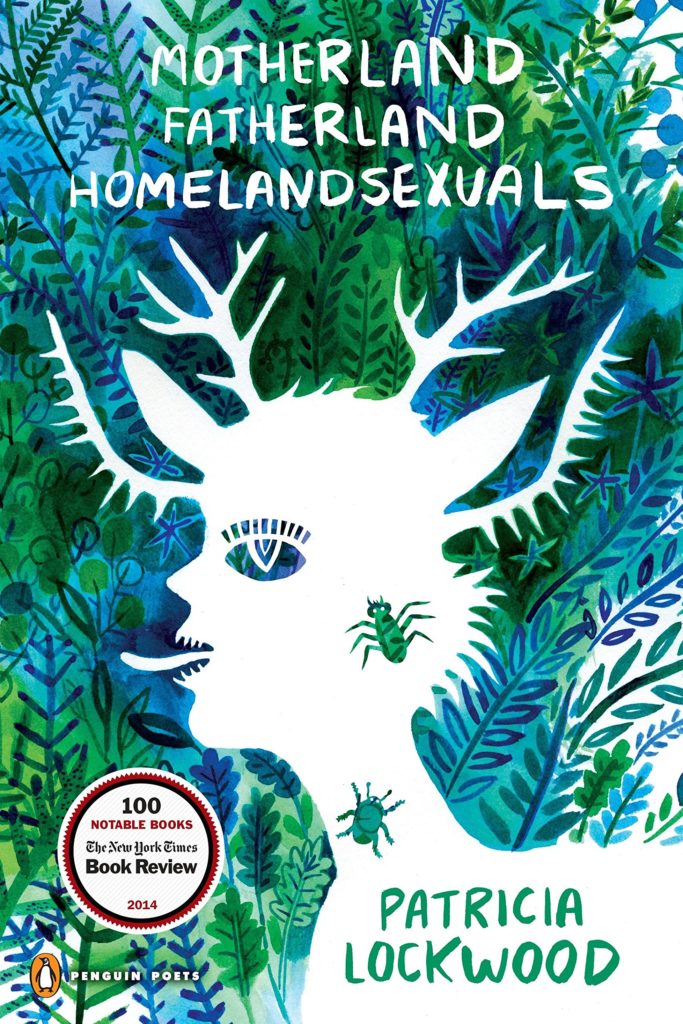 PATRICIA LOCKWOOD, MOTHERLAND FATHERLAND HOMELANDSEXUALS
PATRICIA LOCKWOOD, MOTHERLAND FATHERLAND HOMELANDSEXUALS
(2014)
In my bookseller days, I was always searching for the perfect book to read in slow increments at the registers. We weren’t exactly supposed to read at the registers, but hey, retail is retail. Patrica Lockwood’s collection Motherland Fatherland Homelandsexuals, recommended to me by a coworker who would soon leave the store to study at a seminary (he’s now a Lutheran pastor, spreading the gospel of radical feminism), was the perfect register read, since I felt the need to stop and think after every page anyway, and brief capitalist transactions in which one discusses the weather are the perfect interaction in which to distill the essence of poetry.
Lockwood was initially heralded as the Manic Pixie Dream Girl of modern poetry. A New York Times Magazine profile describes her as “all large eyes, apple cheeks and pixie haircut—like an early Disney creation, perhaps a woodland creature.” The collection’s signature poem, “Rape Joke,” belies this description (as does the collection as a whole), giving us a sarcastic, visceral, and, for lack of a better word, poetic discourse on its title subject. It’s been described to me as “the poem that broke the internet,” and while I’m sad I missed the zeitgeist, anyone who’s read the poem in print would agree that it has awesome power even without the hype. We’ll see if Kristen Roupenian’s “Cat Person” has the same staying power . . . –Molly Odintz, CrimeReads Associate Editor
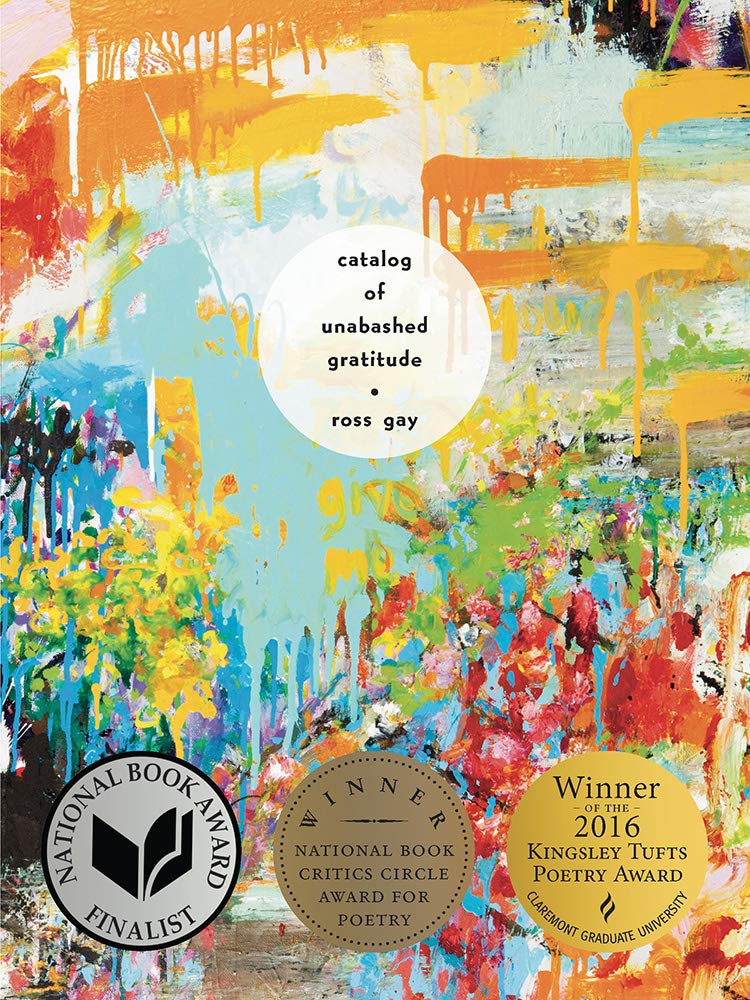 ROSS GAY, CATALOG OF UNABASHED GRATITUDE
ROSS GAY, CATALOG OF UNABASHED GRATITUDE
(2015)
There are sweeping statements to be made about the role of gratitude in 2019, but let’s talk first about Ross Gay’s tomato seedling. In “Tomato on Board,” from Gay’s 2019 essay collection The Book of Delights, the poet describes a flight which he spent sheltering a young tomato plant to transport it safely home. The world, orienting itself around the desire to keep a single plant alive, seems gentler. An older couple smiles at him; the airport security line welcomes him. “When the security guy saw it was a tomato he smiled and said, ‘I don’t know how to check that. Have a good day,’” Gay writes.
This is Ross Gay’s magic; his attention renders everything a little kinder, yielding moments of unexpected softness and deep insight. Catalog of Unabashed Gratitude, published in 2015, is his best expression so far of this power. Gratitude, in Gay’s poems, recognizes moments of exaltation and brutality both; after “the tiny bee’s shadow,” the book’s titular poem thanks “the baggie of dreadlocks I found in a drawer / while washing and folding the clothes of our murdered friend.” The poems cast gratitude and joy not as the byproducts of naiveté but as radical, life-sustaining choices, a reality long recognized by people of color, queer people, and anyone else who has eked out a place in hostile territory. It’s a road map for survival into the next decade. –Corinne Segal, Senior Editor
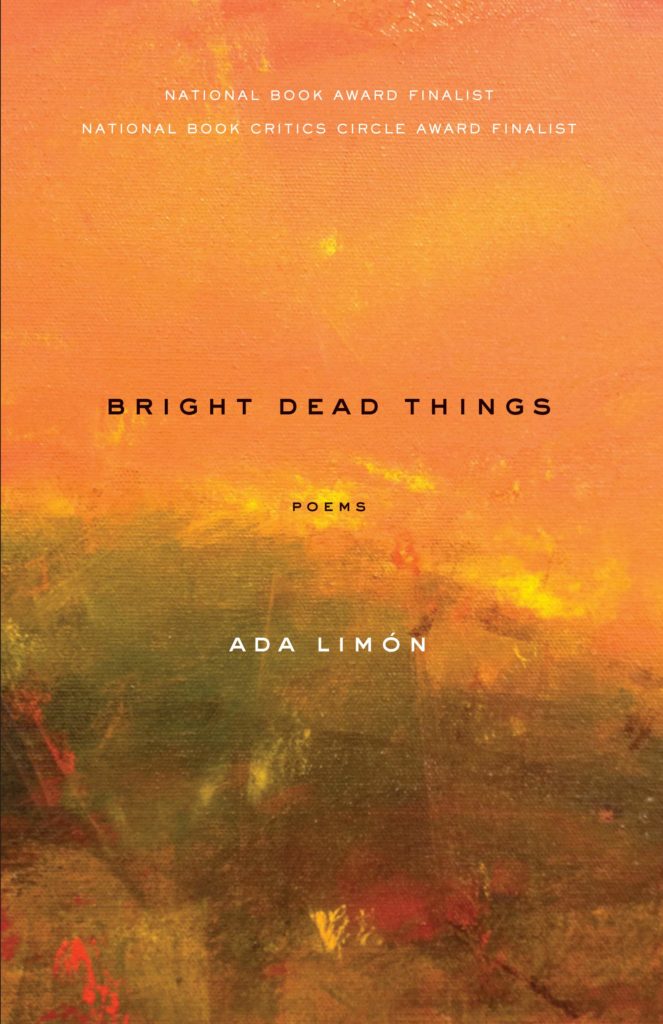 ADA LIMÓN, BRIGHT DEAD THINGS
ADA LIMÓN, BRIGHT DEAD THINGS
(2015)
The best way I can describe the voice of Ada Limón’s 2015 collection is confident without being certain. Uncertainty over the virtues of one place or another as the poems’ speaker moves from New York to Kentucky (“This is Kentucky, not New York, and I am not important”), or the uncertainty over a car-struck possum’s chances for survival (“I wanted to be / sure, needed to know for sure, that it could / not be saved”).
Bright Dead Things is organized into four untitled sections, the first of which opens with “How to Triumph Like a Girl,” which sets the tone for the collection to come—we will be in motion, we will wander, and we will not skirt genuine feeling in favor of irony. “I like the lady horses best, / how they make it all look easy, / like running 40 miles per hour / is as easy as taking a nap, or grass,” she writes. The speaker of the poem admits that she likes the horses mainly because they’re ladies, which means she might share something elemental with them. It means “that somewhere inside the delicate / skin of my body, there pumps / an 8-pound female horse heart.” This is a book that will not hesitate to talk about heart, to name that heart.
This is a book of movement that becomes deliberate in the very moment it occurs. It is a book of unapologetic wandering and unapologetic reflection. It is a beautiful collection, and is all the more beautiful for how it invites its readers to wander with it. –Jessie Gaynor, Social Media Editor
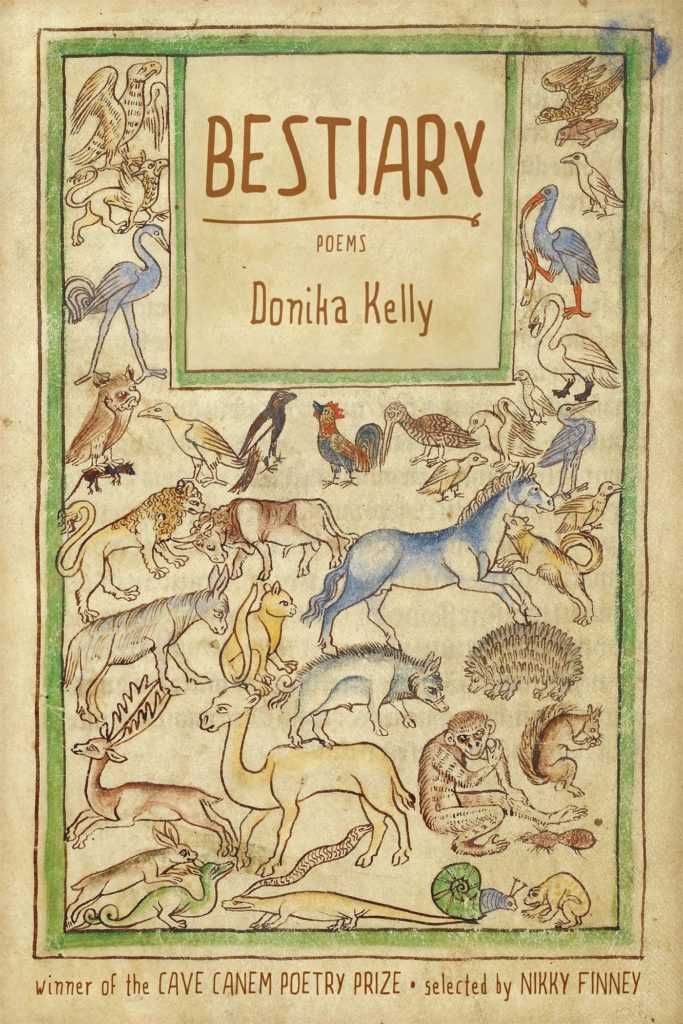 DONIKA KELLY, BESTIARY
DONIKA KELLY, BESTIARY
(2016)
“What menagerie / are we. What we’ve made of ourselves,” Donika Kelly writes in her powerful debut collection, Bestiary. “Bestiary” nods to the popular illustrated volumes of the Middle Ages that contained an amalgam of animals accompanied by fable-like stories. Similarly, Donika Kelly fills her pages with mermaids, griffons, werewolves, satyr, medusa; all the wild beasts, mythological beasts, and human monsters she can summon. She remakes them. And the moral—if there is one—is that sometimes human beings are made up of equal parts love as cruelty. In her imagery, storytelling, and reshaping of myth, Kelly reminds me of the feminist fairy tale master whom I could never do without, Angela Carter. Though the collection echoes some of the poet’s own history, Bestiary is not representative of any one journey—its drawing on mythological monsters prefigures its archetypal quality and intended universal resonance. When selecting this book for the 2015 Cave Canem Poetry Prize, poet Nikky Finney wrote, “Bestiary is the first book of poems by an all Black girl who teaches us that nothing is all black, or all female, or all male, or all belonging to humans, or all tidy.”
Why do we ever pick up a book of poetry if not to have our heart broken again and again? Kelly is not one of those poets who ends her poems on an expansive note—not all of the time at least. She leaves the reader standing on the edge of a cliff, holding her heart in her hand. Her endings are perfectly sharpened blades brandishing the last blow, after a slow rhythmic build. Kelly poises her reader on a tightrope and knows just when to shake. And it is in being punctured and shaken that we enter a place of stillness where we, the readers, can begin to grapple with pain, memory, trauma, on an individual and communal scale. To end with a quote from “Whale”: “finally there was no whale / or breath or sound or woman / finally, there was only the body, / rising through the water toward the sun.” –Eleni Theodoropoulos, Editorial Fellow
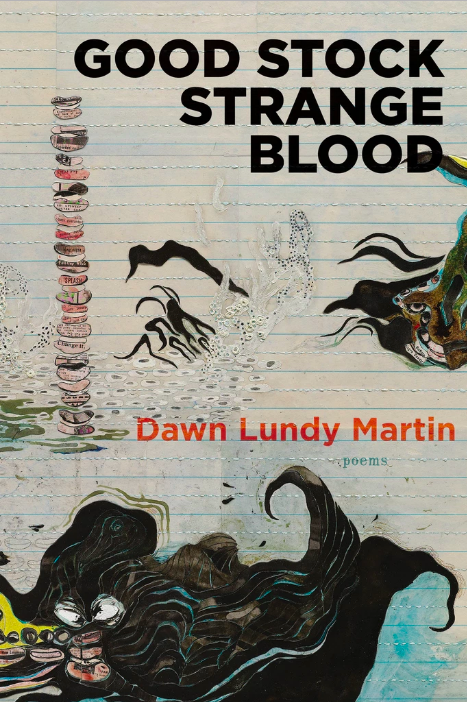 DAWN LUNDY MARTIN, GOOD STOCK STRANGE BLOOD
DAWN LUNDY MARTIN, GOOD STOCK STRANGE BLOOD
(2017)
Claudia Rankine’s Citizen: An American Lyric, published within months of Michael Brown’s death in 2014, is often cited as a paradigmatic text of the Black Lives Matter movement in the US, and its quintessential poetry collection. Three years later, after many more lives lost, Dawn Lundy Martin’s Good Stock Strange Blood was published, and the book feels like a gem that took its time to mature. In “Prologue” (some of the collection’s poems originally appeared in a libretto Martin wrote, Good Stock on the Dimension Floor), Martin asks, “Why doesn’t one just die?” She answers: “What’s keeping us alive is the ability to imagine something very other than what’s been shoved down our throats, what’s been taken up in our cells […] No death. But, instead the door.” This door opens onto a variegated batch of poems centered on how Black bodies are built, conceptualized, cared for, atomized, and ruined. You get the sense that Martin hasn’t reached conclusions for any of the answers, though each poem is exactly that. “I’d think that a thing ancient would not pulse so loudly, would be automatically removed from the atmosphere, lose its atomic structure, its relatability,” she writes. Martin is stunned, in the wake of violent Black death, that such life persists. These bodies have physical heft even though they are so often dematerialized to the point of transparency, to becoming something that eyes look through and objects pierce. Despite the white space that abounds in the book, Martin’s lyrics are textually dense and askew. The reader must rise to meet her, and even then, Martin seems to say, you ain’t quite there. –Aaron Robertston, Assistant Editor
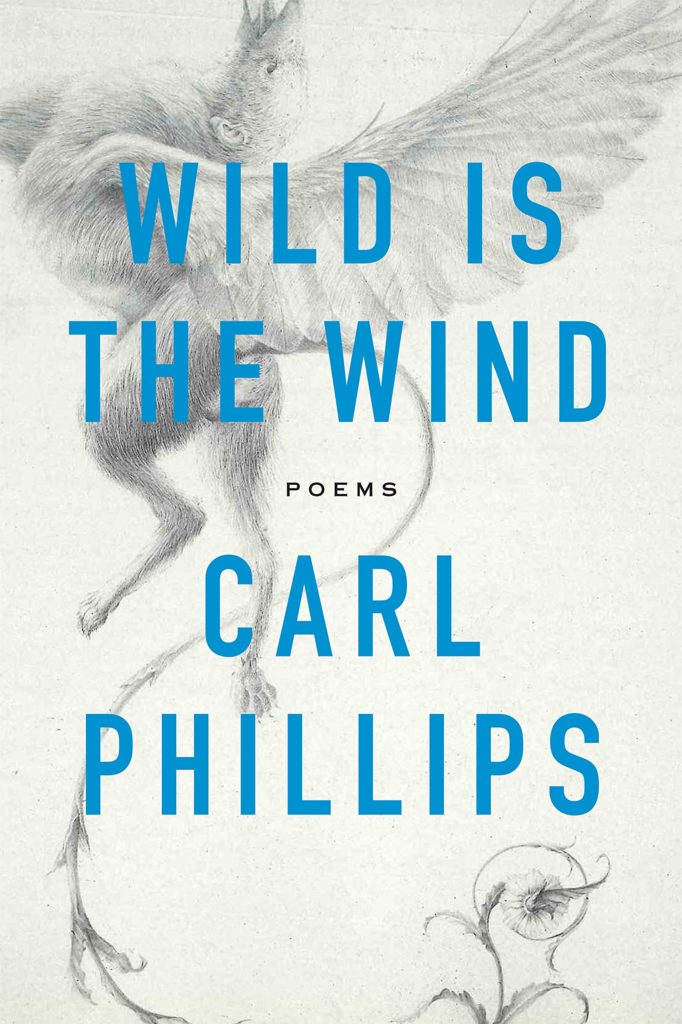 CARL PHILLIPS, WILD IS THE WIND
CARL PHILLIPS, WILD IS THE WIND
(2018)
Trying to write about this collection is a completely hopeless exercise for me. Everything I want to say about it sounds at least a little unhinged, as in: having read it, I can’t imagine not having read it; a copy of it never lasts long with me before I give it away to someone I love; it offers moments of clarity that I’ve never found anywhere else. So many of us have a book for which this is the case, and often—unsurprisingly often—this book was written by Carl Phillips.
The careful, meditative sentences that form Phillips’ poems give the impression of a speaker who is profoundly compassionate to themselves, one who gives themselves the space and time to articulate ambiguity without striving to resolve it, and who can recognize what is beautiful without clinging to it. In Wild is the Wind, questions about attachment and commitment unfold deliberately, and to read them is to listen, carefully, to meditations like this:
There’s plenty I miss, still, that I wouldn’t want back—
which I’m beginning to think might be all regret’s ever had
to mean, and there’s maybe no shame, then, in having
known some and, all these years, I’ve pretty much
been wrong. Not that being wrong means wasting time,
exactly. What hasn’t been useful?
which I’m beginning to think might be all regret’s ever had
to mean, and there’s maybe no shame, then, in having
known some and, all these years, I’ve pretty much
been wrong. Not that being wrong means wasting time,
exactly. What hasn’t been useful?
In addressing questions like these, and others on love and its loss, Phillips constantly returns to impermanence in the landscape—light, water, seasons, the movement of bees—with careful attention to the subtle, elemental shifts that mark the passage of time, the formation of desire, and the crystallization of connection. Allowing us to witness this feels incredibly generous, and I’m thankful that we can. –Corinne Segal, Senior Editor
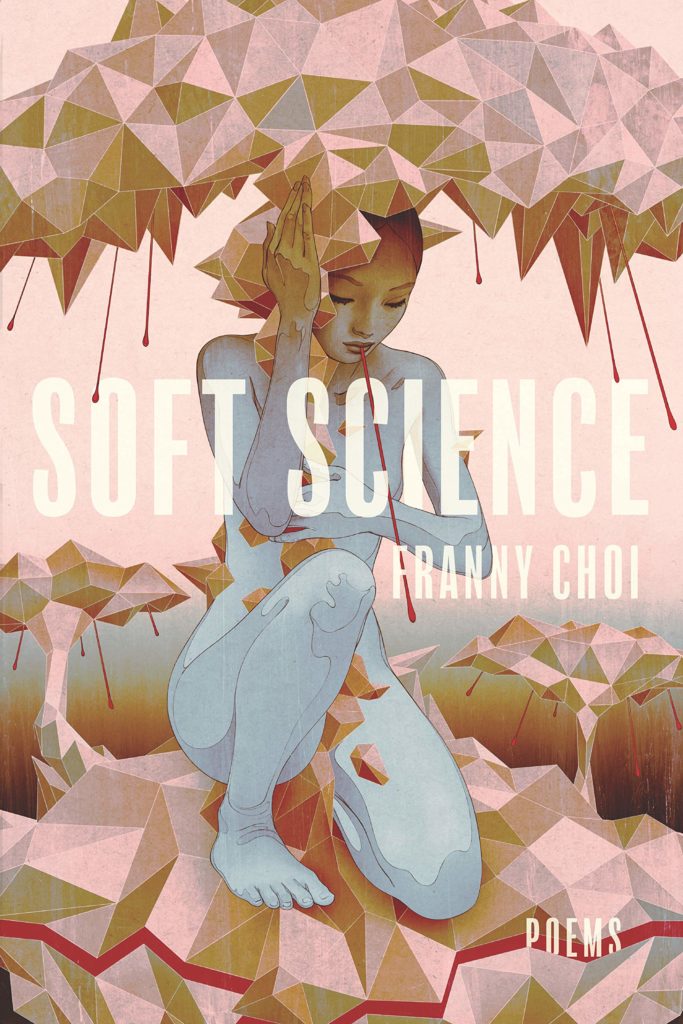 FRANNY CHOI, SOFT SCIENCE
FRANNY CHOI, SOFT SCIENCE
(2019)
I’ll admit it: I don’t read a lot of poetry. I said this to a friend over brunch once, and the next time we saw each other, over eggs, he handed me Franny Choi’s Soft Science. Reader, I loved it from the first page, which is a beautiful glossary of terms. Broken into: Meaning / See also / Antonym / Origin / Dreams of being. A ghost is defined as “the outline of silence.” A mouth dreams of being the sea, while the sea “does not dream; is only dreamed of.” This is the way we enter Franny Choi’s collection. Something I appreciate about Soft Science (especially as a beginner poetry reader) is that it has a structure like this. There are rules. Every section begins with a kind of Turing Test, “a test to determine if you have consciousness.” It’s an intriguing framework and a guiding light. Throughout the collection, the speaker switches from cyborg to flesh-and-blood human and back. Sometimes we’re not sure who we’re listening to, and it’s in this confusion that Franny Choi brilliantly conflates the experience of being a machine and being a woman (specifically a woman of color). That is: the language given to us, the expectations placed on us. The obedience others feel they deserve. But it’s not always so bleak! There’s definitely a playfulness to her poetry, as in “The Cyborg Wants To Make Sure She Heard You Right,” a poem composed entirely of tweets directed to Franny Choi, ran through Google Translate into different languages, and then translated back into English. The titles helpfully situate us in delightful—sometimes funny—situations, like “I Swiped Right on the Borg” and “The Cyborg Meets the Drone at a Family Reunion and Fails to Make Small Talk” and “It’s All Fun and Games Until Someone Gains Consciousness.” There’s a brief history of cyborgs and, later, also a beautiful history of touch. There are poems that read like lists of repeating words, like a machine malfunctioning or the failure of language. Read it! Something in her exploration of technology, of bodies, of womanhood, of the things we ask of each other will dig its hooks in you. –Katie Yee, Book Marks Assistant Editor
***
Honorable Mentions
A selection of other books that we seriously considered for both lists—just to be extra about it (and because decisions are hard).
Kay Ryan, The Best of It (2010) · Christian Winman, Every Riven Thing (2010) · Laura Kasischke, Space, In Chains (2011) · Nikky Finney, Head Off & Split (2011) · Quan Barry, Water Puppets (2011) · Jenny Boully, Not Merely Because of the Unknown that was Stalking Toward Them (2011) · Sharon Olds, Stag’s Leap (2012) · D. A. Powell, Useless Landscape, or A Guide for Boys (2012) · David Ferry, Bewilderment (2012) · Patrizia Cavalli, tr. Gini Alhadeff, My Poems Won’t Change the World (2013) · Rebecca Hazelton, Vow (2013) · Matt Rasmussen, Black Aperture (2013) · Corey Van Landingham, Antidote (2013) · Frank Bidart, Metaphysical Dog (2013) · Vijay Seshadri, 3 Sections (2013) · Athena Farrokhzad, tr. Jennifer Hayashida, White Blight (2013) · Gregory Pardlo, Digest (2014) · Saeed Jones, Prelude to Bruise (2014) · Ed Hirsch, Gabriel (2014) · Louise Glück, Faithful and Virtuous Night (2014) · Terrance Hayes, How to Be Drawn (2015) · Elizabeth Hewer, Wishing for Birds (2015) · Brittany Cavallaro, Girl-King (2015) · Richard Siken, War of the Foxes (2015) · Peter Balakian, Ozone Journal (2015) · Eileen Myles, I Must Be Living Twice (2016) · Ishion Hutchinson, House of Lords and Commons (2016) · Solmaz Sharif, Look (2016) · Tyehimba Jess, Olio (2016) · Daniel Borzutzky, The Performance of Becoming Human (2016) · Eve L. Ewing, Electric Arches (2017) · Layli Long Soldier, Whereas (2017) · Maggie Smith, Good Bones (2017) · Kaveh Akbar, Calling a Wolf a Wolf (2017) · Frank Bidart, Half-light (2017) · Lawrence Joseph, So Where Are We? (2017) · Terrance Hayes, American Sonnets for My Past and Future Assassin (2018) · Ada Limón, The Carrying (2018) · Diana Nguyen, Ghost Of (2018) · Analicia Sotelo, Virgin (2018), Justin Phillip Reed, Indecency (2018) · Mary Karr, Tropic of Squalor (2018) · Ilya Kaminsky, The Deaf Republic (2019) · Jericho Brown, The Tradition (2019) · Brittany Cavallaro, Unhistorical (2019) · Morgan Parker, Magical Negro (2019) · Rebecca Hazelton, Gloss (2019).


No comments:
Post a Comment